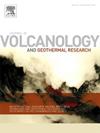在冰岛一个不起眼的渐变山坡上发现的冰缘火山序列:脱冰晚期冰层厚度的意外记录
IF 2.4
3区 地球科学
Q2 GEOSCIENCES, MULTIDISCIPLINARY
Journal of Volcanology and Geothermal Research
Pub Date : 2024-09-27
DOI:10.1016/j.jvolgeores.2024.108195
引用次数: 0
摘要
冰川融化时,火山活动会增加,因为脱冰期的等静反弹会降低地幔压力,从而促进减压融化。目前,人为气候变化正在导致世界各地的冰原和山谷冰川融化,这种脱冰现象可能会刺激冰岛、南极洲、阿拉斯加和巴塔哥尼亚的火山活动和相关危害。然而,目前的模型对冰岛人为冰川消融引起的火山活动的预测约束不足,部分原因是与冰盖排列相比,过去火山产出随时间变化的不确定性。需要进一步研究冰岛冰川火山和冰缘火山的具体特征,以重建冰盖变化时期的火山产出。在这里,我们描述了冰岛西部火山区朗约库尔和雅赫图尔火山链东南部一个宽阔、渐变的山坡上以前未被发现的冰缘火山序列。虽然以前被绘制为冰期熔岩,但该地区的峡谷在现代桑德瓦特恩湖上方的pāhoehoe熔岩流之间发现了两个向西南倾斜的枕状凝灰岩碎屑岩序列。这些枕状凝灰岩碎屑以及相干熔岩和立方体接合面中淬火的一米级空洞表明,熔岩曾与冰和被困的融水小块接触过。然而,凝灰岩-碎屑岩中的碎屑包括枕状凝灰岩和耙蹄岩碎屑的混合物,这就要求水下凝灰岩-碎屑岩面来自于水下流动。此外,我们还观察到亚水生和过渡亚水生-水生pāhoehoe熔岩流与枕状凝灰岩-碎屑岩之间的相互影响。我们认为,在一次降冰期中,来自斯卡尔潘斯附近上坡的次生熔岩向南流动,并与现代桑德瓦特恩湖以北的薄冰接触。我们推测当时当地的冰层厚度为 30-50 米。重要的是,这一发现表明,能够提供古环境制约因素的冰缘沉积可能隐藏在没有形态明显的冰川火山建筑物的地形中。本文章由计算机程序翻译,如有差异,请以英文原文为准。
Ice-marginal volcanic sequence in Iceland found on a nondescript gradual hillslope: An unexpected record of ice thickness late in deglaciation
Volcanism increases when glaciers melt because isostatic rebound during deglaciation decreases the pressure on the mantle, which enhances decompression melting. Anthropogenic climate change is now causing ice sheets and valley glaciers to melt around the world and this deglaciation could stimulate volcanic activity and associated hazards in Iceland, Antarctica, Alaska, and Patagonia. However, current model predictions for volcanic activity associated with anthropogenic deglaciation in Iceland are poorly constrained, in part due to uncertainties in past volcanic output over time compared to ice sheet arrangements. Further work specifically characterizing glaciovolcanic and ice-marginal volcanoes in Iceland is needed to reconstruct volcanic output during time periods with changing ice cover. Here, we describe a previously unrecognized ice-marginal volcanic sequence on a broad, gradual hillslope southeast of Langjökull and the Jarlhettur volcanic chain in Iceland's Western Volcanic Zone. Although previously mapped as interglacial lavas, canyons in this area revealed two southwest-dipping sequences of pillow-bearing tuff-breccias between pāhoehoe lava flows above modern lake Sandvatn. These pillow-bearing tuff-breccias and the quenched meter-scale cavities in coherent lava and cube-jointed facies show lavas came into contact with ice and pockets of trapped meltwater. However, clasts within the tuff-breccias include a mixture of pillow lavas and pāhoehoe fragments, requiring that the subaqueous tuff-breccia facies were derived from subaerial flows. In addition, we observed interfingering of subaerial and transitional subaqueous-subaerial pāhoehoe lava flows with the pillow-bearing tuff-breccias. We propose that during a deglaciation, subaerial lavas sourced upslope from near Skálpanes flowed downslope to the south and came into contact with thin ice north of the modern lake Sandvatn. We constrain the local ice at this time to be ∼30–50 m thick. Importantly, this finding demonstrates that ice-marginal deposits that can provide paleo-environmental constraints may be hidden in terrains without morphologically distinct glaciovolcanic edifices.
求助全文
通过发布文献求助,成功后即可免费获取论文全文。
去求助
来源期刊
CiteScore
5.90
自引率
13.80%
发文量
183
审稿时长
19.7 weeks
期刊介绍:
An international research journal with focus on volcanic and geothermal processes and their impact on the environment and society.
Submission of papers covering the following aspects of volcanology and geothermal research are encouraged:
(1) Geological aspects of volcanic systems: volcano stratigraphy, structure and tectonic influence; eruptive history; evolution of volcanic landforms; eruption style and progress; dispersal patterns of lava and ash; analysis of real-time eruption observations.
(2) Geochemical and petrological aspects of volcanic rocks: magma genesis and evolution; crystallization; volatile compositions, solubility, and degassing; volcanic petrography and textural analysis.
(3) Hydrology, geochemistry and measurement of volcanic and hydrothermal fluids: volcanic gas emissions; fumaroles and springs; crater lakes; hydrothermal mineralization.
(4) Geophysical aspects of volcanic systems: physical properties of volcanic rocks and magmas; heat flow studies; volcano seismology, geodesy and remote sensing.
(5) Computational modeling and experimental simulation of magmatic and hydrothermal processes: eruption dynamics; magma transport and storage; plume dynamics and ash dispersal; lava flow dynamics; hydrothermal fluid flow; thermodynamics of aqueous fluids and melts.
(6) Volcano hazard and risk research: hazard zonation methodology, development of forecasting tools; assessment techniques for vulnerability and impact.

 求助内容:
求助内容: 应助结果提醒方式:
应助结果提醒方式:


